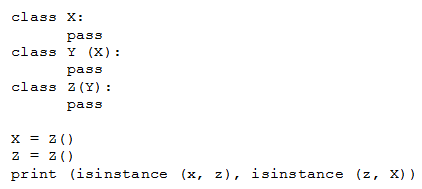What is the expected output of the following snippet?

What is the expected output of the following snippet?

In this code, three classes X, Y, and Z are defined. Class Y inherits from class X, and class Z inherits from class Y. Two instances, x and z, are created as objects of class Z. The isinstance function is used to check if x is an instance of Z (which it is) and if z is an instance of X (which it is, since Z inherits from Y and Y inherits from X). So, the expected output is 'True True'.
serious capitalization typos, however the correct answer is B. class X: pass class Y(X): pass class Z(Y): pass x = Z() z = Z() print(isinstance (x, Z), isinstance (z, X)) >>>True True
Should be B
Correct answer is B. True True
B True True. In this code: There are three classes: X, Y, and Z. Class Y inherits from class X, and class Z inherits from class Y. Two instances, x and z, are created as objects of class Z. The isinstance function is then used to check the types of these instances. Here's the breakdown: x = Z(): This line creates an instance of class Z and assigns it to the variable x. z = Z(): This line creates another instance of class Z and assigns it to the variable z. Now, let's look at the print statement: print(isinstance(x, Z), isinstance(z, X)): This line checks if x is an instance of Z (which it is, as x was instantiated from class Z). It also checks if z is an instance of X (which it is, as Z inherits from Y and Y inherits from X). So, the output of this code will be: B True True.
Should be NameError: name 'x' is not defined.
If you do: class X: pass class Y(X): pass class Z(Y): pass x = Z() z = Z() print(isinstance(x,Z), isinstance(z,X)) you get back True True So B
Please fix these typo's.
True True indeed, tested it and that's the result when all typos are corrected. B is correct
If you do: class X: pass class Y(X): pass class Z(Y): pass x = Z() z = Z() print(isinstance(x,Z), isinstance(z,X)) >> True True So B is the answer
True True
I try to focus on x, X, z, Z. There is no any correct answer.
B. True True
The answer is B
Should be B
Answer is B....if it wasn't for the typos.